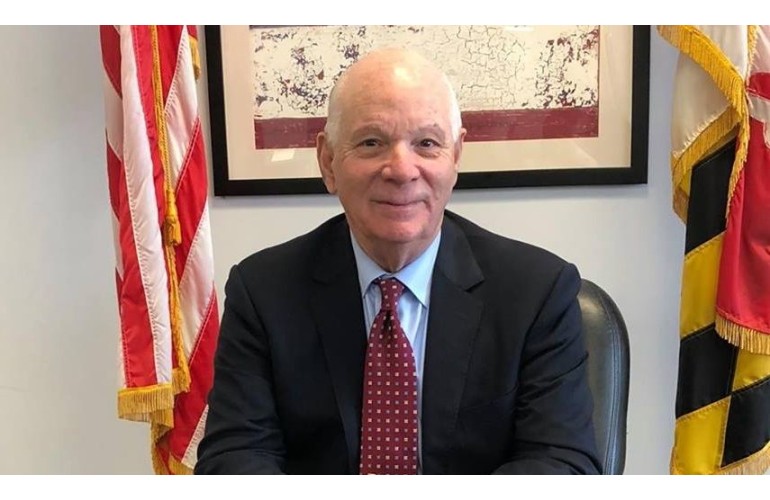 Subscribe
Subscribe- Login
-
/
Sign Up
- US Black Engineer
- >>
- News
- >>
- Infrastructure Bill Town Hall with Senator Ben Cardin nets record participation
|
Getting your Trinity Audio player ready...
|
![]() Earlier today, U.S. Senate Committee on Small Business & Entrepreneurship Chair Ben Cardin (D-Md.) took questions from a cross-section of the Black community in a digital town hall hosted by STEM City USA, Career Communications Group, Inc.
Earlier today, U.S. Senate Committee on Small Business & Entrepreneurship Chair Ben Cardin (D-Md.) took questions from a cross-section of the Black community in a digital town hall hosted by STEM City USA, Career Communications Group, Inc.
Senator Cardin, who chairs a committee at the forefront of rebuilding the American economy, is a senior member of the Senate Foreign Relations, Finance, and Environment & Public Works committees. Nationally, he has introduced legislation to restore the health of America’s great water bodies and is the leading proponent of investing in improvements to America’s aging water infrastructure system while preparing it for the impacts of climate change.
Senator Cardin helped write the Paycheck Protection Program (PPP) that has helped small businesses in Maryland and nationwide, and he created the EIDL Advance Grant program to quickly get cash to small businesses in need. Senator Cardin was responsible for the extension of increased guarantees and reduced fees in the Small Business Administration’s two largest loan programs. He has made it a priority to find better ways to provide access to credit for qualified small businesses and entrepreneurs, particularly minority-owned, women-owned and veteran-owned businesses.
The hour-long town hall and discussion included tips and advice on how minority-owned businesses can benefit from the Infrastructure Bill. Read excerpts below from Senator Cardin’s opening statements.
“We’re negotiating the bipartisan infrastructure bill, which is also part of the budget reconciliation process and part of President Biden’s “Build Back Better” (agenda).
“Before COVID-19, I worked to bridge the gap on entrepreneurship as chair of the Small Business and Entrepreneurship Committee in this Congress. Recognizing that with the wealth gap, and the income gap, we need to make sure opportunities exist in traditionally underserved communities. One of my mentors in all this was Parren Mitchell, the first Black Representative from Maryland. Mitchell went on to chair the Small Business Committee with the first set-aside funding for minority businesses.
“The current opportunity is to Build Back Better. It started with the American Rescue Plan that President Biden was able to get through Congress, one of the most significant bills ever passed. It reduced the child poverty rate by 50% by strengthening the Earned Income Tax Credit and Child Credit. These were incredibly important tools to deal with the wealth gap, income gap, opportunity gap, and systemic racism in our society. We also were able to help local government, help our school systems, help get COVID-19 vaccines distributed. That was part of the American Rescue Plan.
“The second part is the Jobs Plan, and that’s what we’re talking about today. The infrastructure package. But as I talk about this, I also recognize that the American Jobs Plan is part of the American Family Plan.
“The American Jobs Plan, the bi-partisan infrastructure package, deals with traditional infrastructure, our roads, bridges, transit systems, rail systems, ports and airports, and broadband. But we also want to deal with the capital infrastructure.
“The American Family Plan, which will be part of the reconciliation package, includes affordable childcare, extending the Child Credit, Earned Income Tax Credit, universal pre-K to three and four years old, and paid medical leave. The issues that have come to light during COVID-19, where we had a gap, have been made even worse. So, we have to be aggressive. We have a once-in-generational opportunity, and we’re committed to making that a reality.
“I chair the Infrastructure Subcommittee and the Public Works Committee. The infrastructure bill does deal with social justice issues. We want to ensure that the minority contractors can get the jobs and contracts related to this increase in transportation infrastructure or broadband. We want to make sure that there is a fair share regarding the minority community.
“We are also dealing with social justice issues in transportation. We know all too well, in Baltimore, where a highway was built against the wishes of the community. It divided the community, and we want to see that community reconnected. We have money put in there for communities to repair the damage that was done with irresponsible transportation projects in the past that were not sensitive to underserved and minority communities.”
‘Underserved communities, women-owned small businesses, and veteran-owned small businesses
“I’m proud that I was able to get a Women’s Businesses Center located at Morgan State University. I was proud that we got our first Veterans support system in College Park to help our veterans. I supported the mission lenders so that the CDFIs (Community Development Financial Institutions) and MDIs (Minority Depository Institutions (MDIs) get capacity and provide credit to minority communities.”
The senator also hopes to pass three initiatives he introduced in 2019, along with U.S. Senator Mazie K. Hirono (D-Hawaii). The legislation seeks to invest in underserved innovators. The Ushering Progress by Leveraging Innovation and Future Technology (UPLIFT) Act of 2021 will foster innovation and entrepreneurial ecosystems in the minority, low-income, rural, and other underserved communities by providing Historically Black Colleges and Universities (HBCUs), minority-serving institutions (MSIs), and community colleges with the resources to establish and expand incubators and accelerators for underserved entrepreneurs.
The bill would create an Innovation Centers Program within the Small Business Administration (SBA) to award competitive cooperative agreements worth as much as $400,000 annually to institutions that support underserved and low-income communities.

